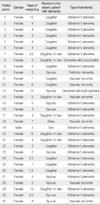Abstract
Purpose
The purpose of the study was to understand and describe the overcoming experiences of family members caring for elderly patients with dementia at home.
Methods
Data came from autobiographies on the overcoming experiences of caregiving from 31 participants, who had submitted the autobiographies to a public contest held by the Seoul Metropolitan Center for Dementia in 2012. Data were analyzed using qualitative content analysis.
Results
Four overcoming stages emerged from the analysis: confronting stage; challenging stage; integrating stage; and transcendental stage, representing transformation of experiences from frustration and suffering to happiness and new hope in life. The confronting stage illustrates severe negative feelings and exhaustion occurring after the diagnosis of dementia. The challenging stage signifies major driving forces in taking good care of their patients. It includes tender loving memories about the patients as well as family and social supports. The integrating stage shows genuine empathy for the patients' situation and the happiness of 'here and now', while the transcendental stage represents new hope in the future.
Figures and Tables
References
1. Abel EK. Informal care for the disabled elderly: A critique of recent literature. Res Aging. 1990; 12(2):139–157.
2. Cho NO. Study on family caregiving burden scale of dementia-Korea (FCBSD-K). J Korean Acad Adult Nurs. 2000; 12(4):629–640.
3. Gaugler JE, Zarit SH, Pearlin LI. The onset of dementia caregiving and its longitudinal implications. Psychol Aging. 2003; 18(2):171–180.
4. Hong YS, Lee SJ, Park HA, Cho NO, Oh JJ. Study on the effectiveness of care giver education program on the home care of senile dementia patients. J Nurs Acad Soc. 1995; 25(1):45–60.
5. Hsieh HF, Shannon SE. Three approaches to qualitative content analysis. Qual Health Res. 2005; 15(9):1277–1288. http://dx.doi.org/10.1177/1049732305276687.
6. Kang HS, Go KJ, Kim WO, Kim ES, Khim SY, Kim HL, et al. The lives of daughters-in-law who care for parents with dementia. J Korean Acad Nurs. 1999; 29(6):1233–1243.
7. Kim CM. The coping process of family caregivers for demented elderly. J Korean Acad Community Health Nurs. 2005; 16(3):249–259.
8. Kim JS. A critical review and vision of family caregiving research on the demented elderly's in Republic of Korea. J Korean Acad Nurs. 1999; 29(6):1419–1433.
9. Kim MS, Kim DH, Kim JS, Park KY, Park NH. Health-related quality of life among women caregivers of older adults with dementia. J Korean Acad Adult Nurs. 2007; 19(1):24–34.
10. Kim YJ. Understanding family caregivers' experiences of living with dementia: A transcendental phenomenological inquiry. J Korean Gerontol Soc. 2007; 27(4):963–986.
11. Kwon JD. Measuring the caregiver burden of caring for the demented elderly. Yonsei Soc Welf Rev. 1996; 3:140–168.
12. Lee HJ, Seo JM, Ahn SH. The role of social support in the relationship between stress and depression among family caregivers of older adults with dementia. J Korean Acad Nurs. 2003; 33(6):713–721.
13. Lee JS, Ha J. The experience of dementia families' defecation care experience. J Korean Acad Psychiatr Ment Health Nurs. 2008; 17(2):204–215.
14. Lee YR, Kim YE. The effects of stress management training on the primary caregivers of demented elderly persons. J Welf Aged. 2002; 15:169–188.
15. Lee YW, Lim JY, Kim JY, Cho HI, Ko GJ. A prediction model for caregiver burden and life satisfaction: Caring for a patient with dementia. J Korean Gerontol Nurs. 2011; 13(3):204–214.
16. Ministry of Health & Welfare. National dementia strategy 2013-2015. 2012. Retrieved January 3, 2013. from http://www.mw.go.kr/front_new/al/sal0301vw.jsp?PAR_MENU_ID=04&MENU_ID=0403&BOARD_ID=140&BOARD_FLAG=00&CONT_SEQ=274723&page=1.
17. Netto NR, Jenny GY, Philip YL. Growing and gaining through caring for a loved one with dementia. Dementia. 2009; 8(2):245–261.
18. Oh JJ. A comparative study on the effects of an individual intervention program and a group intervention program on the demented elderly and their families. J Korean Acad Community Health Nurs. 2008; 19(2):205–215.
19. Pallett PJ. A conceptual framework for studying family caregiver burden in Alzheimer's-type dementia. Image J Nurs Sch. 1990; 22(1):52–58.
20. Sandelowski M. The problem of rigor in qualitative research. ANS Adv Nurs Sci. 1986; 8(3):27–37.
21. Schulz R, O'Brien AT, Bookwala J, Fleissner K. Psychiatric and physical morbidity effects of dementia caregiving: Prevalence, correlates, and causes. Gerontologist. 1995; 35(6):771–791.
22. Song MR, Lee YM, Cheon SH. An analysis of the meaning of respite for family caregivers of elderly with dementia. J Korean Acad Nurs. 2010; 40(4):482–492. http://dx.doi.org/10.4040/jkan.2010.40.4.482.
23. Song MY, Choe GG. The decision factor on primary care giver's burden for senile dementia elderly. J Welf Aged. 2007; 37:131–160.
24. Statistics Korea. Population projections for Korea: 2010-2060. 2011. Retrieved January 3, 2013. from http://kostat.go.kr/portal/korea/kor_nw/2/2/6/index.board?bmode=read&bSeq=&aSeq=252623&pageNo=1&rowNum=10&navCount=10&currPg=&sTarget=title&sTxt=.
25. Weber RP. Basic content analysis. Beverly Hills, CA: Sage Publications, Inc;1990.
26. Wimo A, Prince M. World Alzheimer report 2010: The global economic impact of dementia: Executive summary. London: Alzheimer's Disease International;2010.
27. Yih BS, Kim CM, Yi M. Women caregivers' experiences in caring at home for a family member with dementia: A feminist approach. J Korean Acad Nurs. 2004; 34(5):881–890.
28. Youn GH. Cultural differences in psychological burden and caregiving obligation of primary caregivers for senile dementia patients. J Korea Gerontol Soc. 1998; 18(1):75–90.




 PDF
PDF ePub
ePub Citation
Citation Print
Print




 XML Download
XML Download